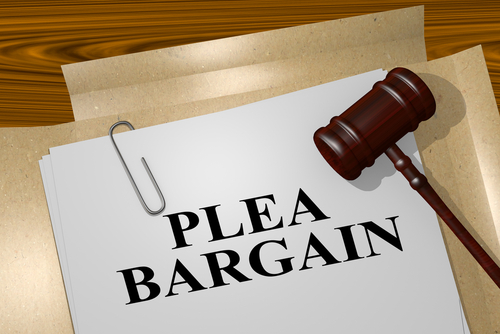A plea bargain will show up on your criminal record, but a Montgomery County criminal defense lawyer might be able to help you avoid this. A plea bargain can be the best option for individuals facing likely convictions, and it carries several benefits. Under the letter of the law, a plea bargain and a conviction are similar.
The nature of the crime you plead guilty to will determine whether you can eventually expunge the conviction from your record by going through the criminal expungement process. For misdemeanors and even more serious crimes like driving under the influence (DUI), or drunk driving, you may be able to remove the plea bargain from your record.
Why You Might Want to Choose a Plea Bargain
There are several reasons why a plea bargain may make sense in your case. A judge or prosecutor will offer you a more lenient deal if you are willing to plead guilty.
From the defendant’s perspective, the incentive for accepting a plea bargain may be twofold or threefold. A plea bargain may make sense for you if you:
- Believe that the prosecution has a strong case against you and that you will receive a conviction if your case goes to trial.
- Do not want to run the risk of a lengthy prison sentence, even if you believe the case against you is weak.
- Would rather plead guilty to a misdemeanor than risk a felony conviction.
- Do not have the financial means to go to trial.
These factors show why many people not guilty of a crime agree to a plea bargain, even if it appears on their criminal record. Your instinct to secure a specific punishment timeframe rather than risk a lengthy sentence makes sense, but it may not be your only choice.
Expanding on the above points, it is essential to understand the complexities and implications of a plea bargain. Accepting a plea bargain can often be seen as a strategic move that carefully weighs the risks and benefits of going to trial versus accepting a known outcome. Here’s a deeper dive into why a plea bargain might be considered a rational choice:
- Belief in Prosecution’s Strong Case: If the evidence against you appears overwhelming, the likelihood of being convicted at trial increases. This perception can stem from multiple factors, such as witness testimonies, physical evidence, or prior convictions. The prosecution’s case might be built so robustly that defending against it in a trial could seem futile. In such scenarios, a plea bargain might offer a more predictable and less severe outcome compared to the uncertain and potentially harsher penalties that could be imposed after a trial.
- Avoiding the Risk of a Lengthy Prison Sentence: The criminal justice system can be unpredictable, and trials are inherently risky. Even if you believe the case against you is not strong, there is always the possibility that the prosecution’s arguments could sway the jury. Accepting a plea bargain can mitigate the risk of receiving a maximum sentence. This option becomes particularly attractive if the plea bargain offers a significantly reduced sentence compared to what you might face if convicted at trial.
- Preferring a Misdemeanor Over a Felony Conviction: The distinction between a misdemeanor and a felony is significant. Felonies carry more severe consequences, including lengthier prison sentences, larger fines, and more profound social and professional repercussions. A felony conviction can impact your life long after you’ve served your sentence, affecting job prospects, housing opportunities, and even personal relationships. Pleading guilty to a misdemeanor can mitigate these long-term consequences, making it a preferable option for many defendants.
- Financial Considerations: Trials are expensive. Legal fees, court costs, and other associated expenses can quickly add up, creating a significant financial burden. A plea bargain can provide a cost-effective resolution for individuals without the means to afford a lengthy legal battle. This financial practicality is crucial for many defendants, particularly those who might otherwise struggle to pay for a robust defense.
It is also worth considering the emotional and psychological toll of a trial. Legal battles are not just financially draining; they can also be incredibly stressful and time-consuming. The uncertainty and public scrutiny associated with a trial can take a heavy toll on a defendant’s mental health and well-being. By accepting a plea bargain, you can bring closure to the legal process more quickly, allowing you to rebuild your life sooner.
Despite these rational incentives, it is essential to remember that a plea bargain is not the only option. Each case is unique, and the decision to accept a plea should be made after considering all factors involved. Consulting with a knowledgeable attorney who can provide a comprehensive understanding of your specific situation is crucial. They can offer insights into the strength of the prosecution’s case, the potential outcomes of going to trial, and the long-term implications of accepting a plea bargain.
In conclusion, while a plea bargain can offer a more predictable and less severe outcome compared to a trial, it is a decision that should not be taken lightly. Weighing the pros and cons with the guidance of legal counsel can help ensure you make the best possible choice for your circumstances.
If I Plead Guilty to a Misdemeanor Charge, Can it be Expunged?
Whether a misdemeanor charge can be expunged after pleading guilty depends on several factors, including the state’s specific laws where the conviction occurred, the nature of the misdemeanor, and your criminal history. Here are some general considerations:
- State Laws: Expungement laws vary widely by state. Some states have more lenient policies that allow for expunging certain misdemeanor convictions, while others may have stricter criteria.
- Type of Misdemeanor: Certain misdemeanors, especially those considered more severe or involving violence, may not be eligible for expungement. Common misdemeanors that might be expunged include minor theft, disorderly conduct, or simple drug possession.
- Waiting Period: Many states require a waiting period after the completion of the sentence before you can apply for expungement. This period can range from a few years to over a decade, depending on the state and the specific offense.
- Completion of Sentence: Generally, you must have completed all aspects of your sentence, including probation, fines, and any required community service, before you are eligible to apply for expungement.
- No Subsequent Offenses: You typically need to have a clean criminal record for a certain period after the misdemeanor conviction. Subsequent offenses can negatively impact your eligibility for expungement.
- Application Process: Expungement is not automatic; you must file a petition or application with the court. This process often involves paperwork, possible court hearings, and sometimes fees.
- Judicial Discretion: Even if you meet all the eligibility criteria, the decision to grant expungement is often at the discretion of a judge, who will consider factors such as your behavior since the conviction and the impact of the conviction on your life.
It’s essential to consult with an attorney who specializes in criminal law in your state to get specific advice tailored to your situation. They can help you understand your eligibility, navigate the application process, and increase your chances of a successful expungement.
Do Not Accept a Plea Bargain Without Consulting a Lawyer
For some, plea bargains may seem like the obvious choice, but you should consult an attorney before you agree to a plea bargain. There are several reasons for this, each highlighting the crucial role of legal counsel in navigating the complexities of the criminal justice system.
Your attorney may be able to do the following:
- Secure a shorter sentence by leveraging your willingness to accept a deal, should the conditions be right. Prosecutors often have heavy caseloads and are motivated to resolve cases efficiently. This can sometimes work in your favor if you have a skilled attorney who understands the nuances of plea negotiations. An attorney can negotiate with the prosecutor to ensure that the plea deal offered is the best possible, potentially reducing the severity of the charges or the length of the sentence. This intricate negotiation process requires a deep understanding of legal principles, prosecutorial strategies, and the specific details of your case.
- Ensure that you understand every aspect of the deal. Plea bargains involve waiving certain rights, such as the right to a trial by jury and the right to confront your accusers. These are significant decisions that can have long-term consequences on your life. An attorney will break down the legal jargon and explain each term of the plea bargain, ensuring you are fully informed before making any decisions. This understanding is crucial, as accepting a plea deal without comprehending its full implications could result in unintended and adverse outcomes.
- Provide insight into what a plea bargain means upon your release and/or when your probationary period ends. Plea deals can have far-reaching consequences beyond the immediate sentence. They can impact your future employment prospects, housing opportunities, and even your ability to travel. An experienced attorney can advise you on these potential ramifications, helping you to make a decision that considers not just the short-term relief of a reduced sentence but also the long-term implications for your life after serving your sentence. For example, certain plea deals might require you to register as a sex offender, limit your voting rights, or impose other post-release restrictions that could affect your reintegration into society.
- Assess whether the plea bargain is in your best interest compared to going to trial. They can evaluate the strength of the prosecution’s case, the likelihood of a conviction, and the penalties you could face if found guilty. Sometimes, the evidence against you might be weak, and a trial could result in an acquittal or a more favorable outcome than the plea deal. Without professional legal advice, you might miss these crucial considerations and accept a deal that is not in your best interest.
- Identify any procedural errors or violations of your rights that occurred during your arrest or investigation. These issues can sometimes be leveraged to negotiate a better deal or even to have the charges against you dismissed. For instance, evidence obtained through an illegal search or seizure might be inadmissible in court, significantly weakening the prosecution’s case.
Furthermore, an attorney’s involvement in the plea bargaining process protects your rights. They can shield you from coercive tactics or undue pressure from law enforcement or prosecutors, who might be eager to secure a conviction. With legal representation, you have an advocate committed to your best interests and can counterbalance the power dynamics that often favor the prosecution.
What McKenzie Law Firm Can Do for You
When you hire a criminal defense attorney from McKenzie Law Firm to represent you, your lawyer will ensure that you understand a plea deal’s parameters before signing, including whether a plea bargain will appear on your criminal record. We protect your rights while explaining your legal options. Once you are our client, we make ourselves accessible via email, social media, and telephone (both texting and calling) to ensure complete transparency.
The legal process can be scary, even for individuals with previous convictions. We ensure that you are not taken advantage of. If you hire an attorney, they can ensure that you and your family fully understand the parameters of a plea deal before signing.
The stakes are simply too high to sign a deal without seeking the advice of legal counsel. If you are considering signing a plea bargain, allow us to help. Contact us today for a free evaluation of your case.



